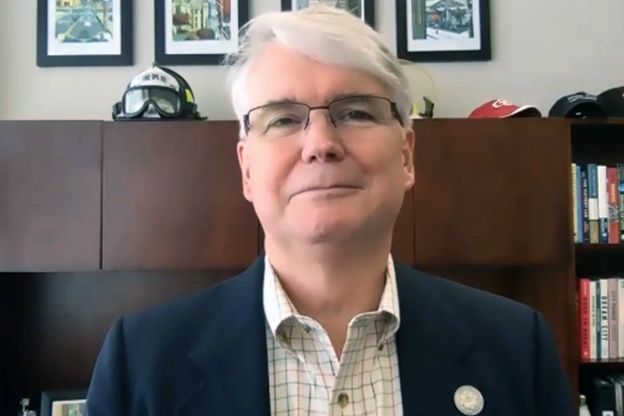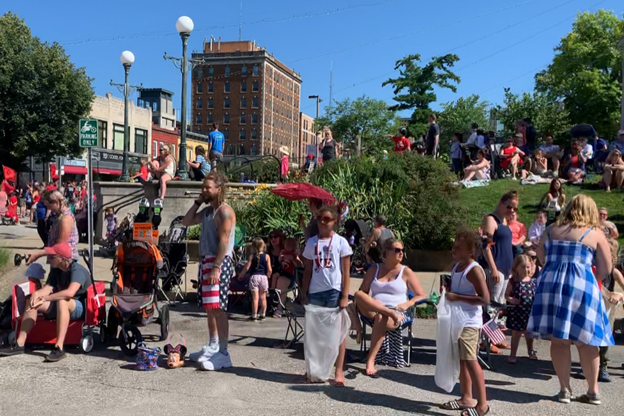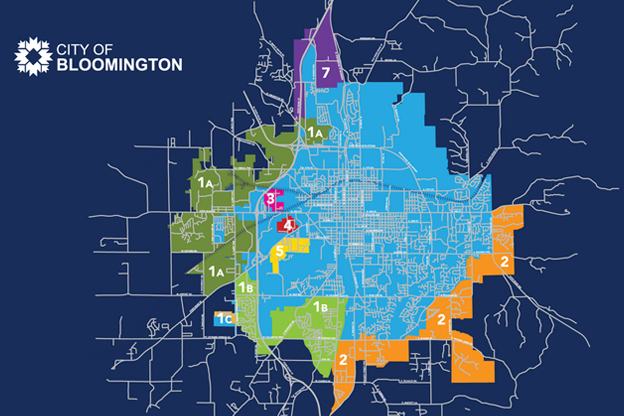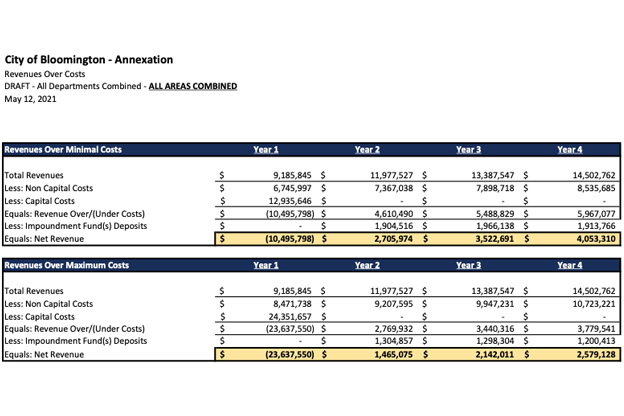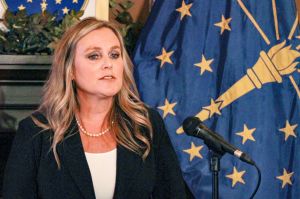Unknown Speaker
I'm good. Joe, really nice to be with you again.
Unknown Speaker
Well, thanks for having us. Also, thanks for letting us do Facebook Live. So much, so much to get to in a short amount of time. So let's just get right down to it. Of course we have you do annexation. I'm gonna ask you about July 4. But let's just start with the COVID. Effective on Monday, mask mandate lifted gathering limits, I believe are lifted. It's kind of this breath of fresh air no pun intended. But you know, it's still not over. So county positivity rate went up a little bit, I think and only 33% of Indiana's population fully vaccinated. So my question is it's kind of collective WE ARE WE opening ourselves to more variants and restrictions in the future by all this relaxing of or loosening of restrictions?
Unknown Speaker
Well, it's a really good question. It's been a very busy few days, as you indicated, really kicked off by the Center for Disease Control the national news last week, on Thursday that said, for those who are vaccinated, the science and the evidence really says you are safe, you can do most anything that you used to do there. There are a number of restrictions on public transportation and certain congregate facilities, but basically saying you can unmask, you can get together with people that was a that was a huge step. And normally, I mean, it's one we should celebrate, right? We've come a long way. And the vaccines are really working very well. at our level at the local level, as you indicated, it is a little complicated because most people are not vaccinated. Those who are vaccinated that directly applies to but most people are not vaccinated. And that means they're still real risk of transmissions of sickness, even fatalities and such. So at the local level, we did feel the county health department took a step to to drop the local regulations that were different from the state. We followed suit from the city, but you're right, we are not out of the woods yet. It is important to know if you get vaccinated, there, you're in, you're in good shape and a lot of ways but if you're not vaccinated, there still really substantial risks ahead.
Unknown Speaker
You know, it's like kind of that tough question, but you know, how do you give access and open up to those who wore masks are getting vaccinated want to return to normalcy and economy and all that but then, when most people have not been vaccinated,
Unknown Speaker
It's it's definitely complicated and look all if anything we've learned over the last year, it's we got to be flexible, we've got to be resilient, we've got to keep paying attention to how it's going. I think on the one hand, it makes a lot of sense to recognize the importance, the significance of vaccinations, and helping those who do get vaccinated to understand you're in a really good position. But at the same time, it's important to recognize we're not all vaccinated, and we're not all out of the woods. And there still are risks. And so it is asking individuals and families and, frankly, businesses and institutions employers to make those kind of judgments about how they're going to move forward. On the one hand, really exciting, we knowing that the vaccines are working, on the other hand, knowing we're not out of the woods, yet, we've got to keep paying attention. For example, as an employer, there's a lot of decisions we have to make as a city about how to move forward. And we're trying to take it deliberately and thoughtfully each day.
Unknown Speaker
And some businesses can still require to wear masks and the city will help them enforce that, right.
Unknown Speaker
Businesses absolutely can put those kinds of requirements in place for people, they could say, show us your card or you have to wear a mask, your vaccine card, they could do that for employees. Most proprietors most private entities can do that on their own. There are some restrictions on governments under law, but we encourage people to be very thoughtful and careful about how to protect your employees how to protect your families. And those you interact with
Unknown Speaker
Bloomington Fourth of July parade, fireworks, Any word on whether that will return this year?
Unknown Speaker
You know, Joe, I don't know if we've announced it all. That's always tricky. I do believe we've announced that there will be a parade. I think it's going to be a reverse parade though. Where the where the contestant the parade entries are fixed. And parade attendees drive or walk by them. So it's a little different. And that's COVID protocol. And I think the fireworks. I'm not sure that that's planned, but I don't know if the final decision has been announced yet.
Unknown Speaker
Okay, well, we'll look forward to more information on that. Let's move on to the you do the duplex zoning ordinance. And the new zoning map passed 63 Thursday night. What happens next with all this?
Unknown Speaker
Yeah, again, just to put in context. This is a multi year process that essentially concluded there's one final step going back to the plan commission. That's kind of a technicality. But the the overall zoning ordinance was passed, it was amended at various times in past six to three. I'm really pleased that the council move forward with that and the Planning Commission, I think we're in a good spot. We've done a lot of really good things for zoning from multifamily student housing zone to simplifying rules or many people and getting rid of about 100 kind of legacy arcane planned unit developments and as well dealing with the idea of how to advance the missing middle some of those plexes and other such things, I think we've reached a good compromise to move ahead. That opens the door for evolution and in more inclusion, but also assures folks, we're not going to see dramatic, detrimental change, and we'll be watching it as we go. The map past I think eight to one, and that's done. Doesn't have to go back to the to the Planning Commission and otherwise it should be locked up and ready to move forward any week now.
Unknown Speaker
And of course you say a good compromise because I believe there were two amendments that passed that do help kind of control the spread of duplexes. There was a thought a good question from Councilmember de Rolo that night about why is this in the UDL and not the comprehensive plan? Can you explain the difference between the two and why this was this duplex ordinance was added to the UDL?
Unknown Speaker
Sure, the comprehensive plan is kind of a little more thematic and, and aspirational. Talking about goals for the city. And you kind of had dueling dueling teams using the comprehensive plan for different purposes. In some ways. There's, it's the kind of document there may be a sentence here or a sentence there that different people can pull out and use some sometimes out of context. But that document is a guiding document, but the UD O is the legally binding rule of what you can do. And that's really the appropriate place to put zoning changes and and such things in I think Councilmember Rolla was suggesting, hey, if this represents a change in approach, we should do it in the comprehensive plan. I think others of us don't really view it as a change of approach but really an evolution directly from inconsistent with the comprehensive plan.
Unknown Speaker
You know, that meeting that At night on on Thursday, I heard a lot I heard, you know, don't be evil. You're not giving residents a voice, there was talk of racism and classism, then from even our perspective, you're giving the mayor too much of a platform, then we hear those who are against duplexes. You're giving them too much of a platform. And there's different data sets for different claims. And it just really, really seem to be a divide. And people are talking about how this really divided the community was, was there a better way to push this through? Or kind of what went wrong there to to to, for all this decisiveness?
Unknown Speaker
Well, look, democracy is fine to have people with significantly different views about how we should proceed. I I do you know, in the last year or two or four, there has been kind of an escalation, it feels sometimes that says if we disagree, we, we have to attack the other person it. Democracy is full of disagreements and the council had amendments, some succeeded, some failed. different members of the community felt strongly one way or the other. It's really important, I think, to honor that the democratic process worked very well. There were many, many hours of debate and discussion. I do regret sometimes it seems tempers get hot and and accusations can fly between different viewpoints. But I view this is a really healthy debate about the direction of the of the city, the overall direction was, was approved to say let's loosen up this very restrictive single family zoning a little bit. It's been since World War Two, there are some bad reasons it happened. But there's certainly reason to be sensitive about it as well as it changes. And I think that compromises as we said, you know, 15 max per year separation by space, we there was changing significantly in the map. So there's a lot of give and take. It's just unfortunate people view that give and take is not just a healthy part of democracy where we have different viewpoints.
Unknown Speaker
And something else that will have a lot of different viewpoints is the annexation. The city came out with the fiscal analysis late last week. I was wondering if we could just start with I guess I was surprised how much the city had a negative balance to catch up. I guess that first year was about 10 million and under minimal cost. And then there was maximum costs. I assume that for initial infrastructure, but then had a surplus. The next three years in the grid had like a four year chart. Can you explain that a little bit more?
Unknown Speaker
Yeah, well, you know, annexation is a it's often an issue that attracts attention. Bloomington has annexed for the vast majority of our history, we've done hundreds of annexations. Otherwise, we'd be a city the size of about six square blocks in the downtown if we hadn't annexed since we began. Almost all of us who live in the city of Bloomington live on annex land. So this is a continuing process to right size the city. The fiscal analysis, really looks in great detail parcel by parcel 1000s of parcels that what's the tax implications for the parcel owner? And what are the tax implications for the city and other taxing jurisdictions. And as you indicated in that's all described by state law that we have to do this, this kind of analysis. The initial costs are higher as the city, for example, buys sanitation trucks or buys you know, more police, vehicles and services in front front loads a lot of that we may well financed that over a five or 10 year period to smooth that out a little bit. But overall, it's embracing urbanized neighborhoods into the community, and they will get the same level of services that the other parts of our community, it's kind of like, if you think of the city as a family, we're bringing new sibling in and that sibling gets the same treatment as every other sibling in the family of Bloomington.
Unknown Speaker
So but explain that like so the the first year the city could be under about 10 million in a minimal cost situation and then had I think 26 million in a maximum cost, which is a big difference that but then after that first year, there was a few million dollar in surplus. Is that right? Am I reading that? Right?
Unknown Speaker
Yes, I mean, overall, Joe, the picture is that this is a financially feasible annexation, that the over time the revenues match roughly then aids, which is what we would expect, because they do that in our city, we provide the services that the revenue support. Just as an example of why it looks so front loaded is we put all the costs of, for example, to new planned parks, that would be part of bringing these places into the city, we would invest in parks. Well, all the cost of those parks is front loaded in that first year that may not be incurred in the first year. And it may not it may be financed, it could be spread out, but just for for analysis, it's done that way.
Unknown Speaker
And of course, that's to extend police trash roads, I saw animal control, bus service transit, but not by fire, right Fire Department will stay under where they're at.
Unknown Speaker
Yes, a state law that passed in the four years since the legislature illegally stopped the annexation of state law that passed, set up a new rule that says if you already get fire service from a certain size fire district, too big enough, then you don't change your fire service. When you're annexed automatically. You just stay where you are. I think that's a really ill advised law. And it covers about 90%, almost of the of the territory that we're considering indexing. So those folks would retain the service of fire from the Monroe County Fire Protection district, whereas this very small number would switch on to the Bloomington fire department that was really well in annexation. It's a change in the law.
Unknown Speaker
Okay. And that's why I think page I've written down here, page 79, there was about a million dollars for fire, but that's for the small area that that the city would take over?
Unknown Speaker
That's correct. That's correct.
Unknown Speaker
Okay, um, people want to know, you know, how much they'll be paying. And I was looking again, through the grid, and it kind of ranged from 2% to 80%. It just, there were a lot of different scenarios and a dependent where you lived in different different parcels. The majority, maybe a 40% increase, which about about $1,000 a year is Is that about right?
Unknown Speaker
Oh, well, there's a lot of different kinds of property. If you look at it, and we'll go through this more, and there's plenty of time to talk about it, the average residential customer residential owner would see something around four or $500 annual increase in their property taxes net, that would kick in in 2025. By the way, it's four years down the road. So nothing happens for for a number of years. Some people actually, if you look at the average, senior over 65, if you're a homeowner over 65, and have a modest income, your tax bill actually net goes down after annexation a little bit. If you know if you're a commercial property owner or industrial property owners, those those can be big, much bigger numbers and can significantly skew the averages. But looking at residential property, as you join the city, you pay the city tax rate. It's not a higher rates, not a lower rate, everybody's rates the same. And that has a few $100 a year impact usually to pay for the services like the new parks and sanitation, recycling pickup and road maintenance. And you know, there's there's a sanitation fee to but road maintenance and housing inspections and all the arts investments that we do and police protection as well.
Unknown Speaker
Why would seniors, property taxes go down after being annexed? I don't understand that part.
Unknown Speaker
There's their significant deductions in protecting any rise in property taxes for a number of folks, including, for example, relatively low income seniors who own their home. And with the net benefits, there's some some reduction in costs. For example, for sewer service, and others, you can actually see a net reduction. And that's all in the fiscal report. And you actually can look up parcel by parcel what the impact on you is projected to be. Now, I do want to be cautious too. These are fiscal projections for five years from now on what the property tax rates will be in the impact you but again, Bloomington has done this many, many, many times. Now. We haven't done it for 17 years. There's a bit of a catch up. But But what this does is brings people who are in urbanized areas into the city as we've done really since 1818 when we started
Unknown Speaker
so have you been in any talks with the county commissioners or council because it's that as the city grows and add axes, it's also decreasing County. resources because they still have to pay, but know that the health department or fire services courts, what what what are the discussions going on there and
Unknown Speaker
so that they won't be hurt? Yeah, they're they're very live discussions, we've had many already several and will continue. And as I've got an open door to do that, again, this is what has happened many, many times in the city's history as the city's boundaries change. Of course, the county's boundaries do not change in their in their general tax allocations, force property tax don't change, they continue to fund as you indicated, the key county wide services they provide like courts, like the health department. They care they care for all the bridges in the county. But it does change their responsibility, for example, for maintaining roads, or for providing Sheriff coverage because the police and sheriff's but one thing the fiscal analysis showed was that the county will actually have more revenue per road mile they're responsible for after annexation compared to before. But those are the kind of details we want to talk about. It does change income tax allocation a little bit, which is based upon population, but again, that generally funds those ranges of services that are that are changing as the boundaries change to
Unknown Speaker
Oh, why do everything in just one big piece right now? Is this effective? What I mean? Well, this to kind of draw more dissent and division with local leadership and doing this in one big swoop?
Unknown Speaker
It's a really good question, Joe. I mean, there's a couple different ways to think about it one, because we have an annex for 17 years, no annexation, there is a big pressure in the in the pipe, if you will, for all the growth that has happened Bloomington, and population has grown a lot dense developments have happened. Right next. And if and if we tried to do it a piece at a time, it would take us a long time to catch up. Another way to think about it is if we do this, or something much like this proposed annexation, and the count city council will decide ultimately the boundaries. It puts us in a position indeed to do that kind of incremental a little bit at a time year by year, regular annexation that I that we should have been doing from my perspective over the last two decades. But we need to catch up or we will always be behind and won't be able to catch up. So that's that's why it's being proposed to really do this catch up after 17 years, and then we're in a good position to do it incrementally going forward.
Unknown Speaker
I know we're running short on time here. I did want to get to and of course we'll keep the lot more questions on this through June. And I know that will be is it Wednesday night. The next city council meeting, this will be addressed to right
Unknown Speaker
Wednesday night is the first kind of formal step the council does to resume the process by updating the the ordinances and the fiscal plan. And then there's a scheduled big public hearing in August August 4, I think, with lots of time in between to talk and then another decision 30 to 60 days after that when the council so September October, when the council will probably take final action on this. So there's plenty time to talk about it. I'm sure we will some more.
Unknown Speaker
I see there's a big announcement on Thursday about the john Waldron Art Center. Is there anything you can tell us before Thursday about that announcement.
Unknown Speaker
And nothing particular though, I will think we had a wonderful taskforce of nearly 20 people or so that really studied the water. And you know, it's the it's the second time that's been returned to the city from our ownership that we had transferred to others to use. And I really asked this group of folks to think about well, what should we do with it this time, and they made a number of recommendations, and I'll be talking about those and other aspects related to the arts community as we go forward. So tune in for that. And we happy to talk about that next time, too.
Unknown Speaker
All right. Do you have any other announcements? Or final word?
Unknown Speaker
Well, I might just mention we had a really exciting little thing, but it changes the life we started a new program to help people buy homes in the city. You know, much of what we talk about with annexation and videos is thinking about affordability and how people live in the city. And there's the first time we've had a homebuyer who worked in our shared appreciation program. So a person who has been a 10 year Bloomington renter is buying your house with a big loan help from the city. And the structure of that is a 0% loan that really helps her buy a home she otherwise couldn't buy $155,000 Then whenever she sells it, the next person kind of carries forward that loan keeps it affordable. So it's a first step that I'm very excited about to help build a portfolio of long term permanently affordable homes in the city. And that just started and I think was announced today, that first buyer.
Unknown Speaker
All right, well, thank you very much. And, boy that goes by so quick. We're out of time already. But we'll have plenty, plenty more to talk about next month and we got a lot of questions in two. We'll try to get to those next month about affordability and housing, and the new development that's being proposed over about the old Kmart site. So we'll, we'll try to get to that next month. Thanks for your time for those watching. please feel free to submit your question on twitter at ask the mayor you can email us news at Indiana public media.org. And we'll be back next week with Nashville municipal consultant DAX Norton. Thank you.
Unknown Speaker
Thanks again, Joe.







